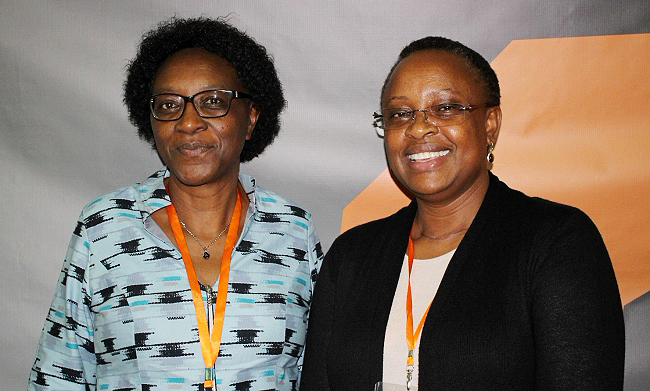Eighteen (18) researchers from seven (7) Sub-Saharan countries were on Saturday 1st December 2018, awarded Certificates of Participation by Makerere University following the successful completion of the first Gender-responsive Plant breeding course tailored on demand for the International Crops Research Institute for the Semi-Arid Tropics (ICRISAT) – a member of the CGIAR consortium.
The tailored course was organized under a five (5) year (2015-2020) Makerere University (Uganda) and Cornell University (USA) joint certificate program in applied gender training for agricultural researchers titled, “Gender-responsive Researchers Equipped for Agricultural Transformation (GREAT) funded by the Bill & Melinda Gates Foundation.

The course was tailored for scientists working on the Tropical Legumes III project implemented by ICRISAT, the International Institute of Tropical Agriculture (IITA) and the International Center for Tropical Agriculture (CIAT), and jointly organized by the College of Agricultural and Environmental Sciences(CAES) and the School of Women and Gender Studies(SWGS) at Forest Cottages Bukoto, Kampala, from 26th November to 1st December 2018.
The course attracted social scientists and plant breeders working in National Agricultural Research Systems (NARs) and Universities on various breeding programs under the Tropical Legumes III project from Uganda, Tanzania, Ethiopia, Burkina Faso, Mali, Ghana and Nigeria.

The purpose of the training was to offer skills in gender responsive research, tailored to assist agricultural researchers to address gender issues along the design, implementation, evaluation, and communication pathways of their research projects.
The Tropical Legumes III project (TL-III) is a major international initiative that seeks to develop and deliver seed of improved cultivars of common bean, cowpea, chickpea and groundnut at scale to small-holders, while also fundamentally strengthening plant breeding programs to generate increased rates of genetic gains.
Participants were taken through a range of topics including: the importance of gender in agriculture, anchoring gender research questions in research projects, gender responsive plant breeding and setting breeding priorities, principles of quantitative and qualitative gender research, engendering data collection methods, women empowerment, and how to develop gender responsive product profiling tools.

After an exhaustive and insightful training, participant teams drew and presented work plans for the next steps towards improving the breeding programs in their respective countries
Speaking during the closing ceremony on behalf of the Principal CAES and Makerere University Vice Chancellor, the College Registrar (CAES) Mr. Edward Obura congratulated fellows upon successful completion of the course.
Mr. Obura also commended the role played by CAES and the SWGS in conducting the GREAT Spin-off course.
“I take the pleasure to congratulate the GREAT team and the researchers upon completing the Tropical Legumes III course. Having successfully participated in this course, all of you are now change agents. Go out and transform the world,” he said.

Beyond the award, the course participants – breeders and social scientists alike said they had acquired skills that will transform their work in their respective countries.
“…When conducting the Participatory Varietal Selection (PVS), I considered the number of male and female participating without taking into account the voice of both gender groups which could increase the adoption rate. In addition, gender issues didn't come up in planning activities but only appeared in the middle of activities and in the report when we were supposed to show how many men and women participated, which I thought sufficiently demonstrated that I was gender responsive. From this GREAT-TL III gender training, I acquired good knowledge and skills, and going forward, the Tanzania groundnut breeding program will consider real gender and not the number of female and male participants during the PVS.” Happy Daudi, a female breeder from Tanzania said.
Chris Sebatta, a male Agricultural Economist working with the Uganda groundnut breeding Program also had this to say,
“…After attending this training course, I have come to realise that as a social economist I have to put on a gender lens whenever doing research whose outcomes will benefit all stakeholders including women and men. Quantitative research alone cannot bring out the complete story without the qualitative part. Many times, as a social economist, I have always believed in the numbers to explain many agricultural issues without realizing that the qualitative part is as important as the quantitative and that the two are complementary.”

The Principal Investigator (PI) Makerere University Assoc. Prof. Margaret Mangheni Najjingo appreciated the participants for undertaking and completing the course.
Dr. Mangheni said, this was the first spin-off following demand by different players to have GREAT short courses.
She appreciated the facilitators for building the trainees’ capacities and in a special way acknowledged the project partners for choosing Makerere University as their trainer towards agricultural gender responsiveness.
“The vision we have as GREAT is to transform the breeding in Sub-Saharan Africa and to close the gender yield gap by considering men and women’s gendered issues in the breeding processes. To do this, we heavily rely on our partners”, she said.
The PI also implored participants to continue engaging and strategizing on transforming the agricultural and poverty security in Africa.

In her remarks, ICRISAT’s Gender Scientist for East and Southern Africa Dr. Esther Njuguna described the workshop as a success.
“In these 6 days, we have succeeded in having conversations, interrogating ourselves, critiquing our own work, critiquing our colleagues and our peers and getting to the point where we feel we have gotten better.
Let us see to it that this knowledge does not remain theoretic. Let us step out and test it and let us continue sharing the progress amongst ourselves for appropriate performance tracking,” said Dr. Njuguna.
Report compiled by;
Esther Namitala,
Public Relations and Communications,
School of Women and Gender Studies,
Makerere University.

 Humanities & Social Sciences5 days ago
Humanities & Social Sciences5 days ago
 Health1 week ago
Health1 week ago
 General4 days ago
General4 days ago
 Agriculture & Environment1 week ago
Agriculture & Environment1 week ago
 General1 week ago
General1 week ago










